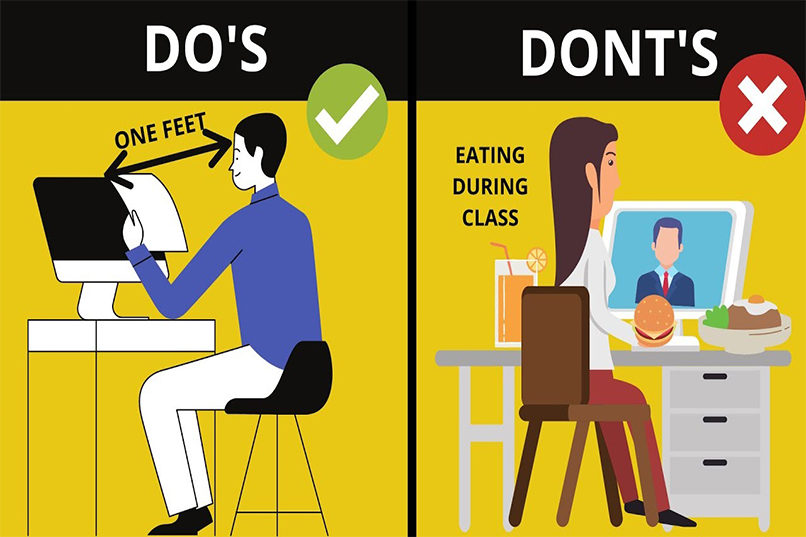Online learning has become an increasingly popular option for education in recent years, especially since the COVID-19 pandemic forced many schools and universities to move their courses online. While online learning can be a convenient and flexible way to obtain an education, it also requires discipline and self-motivation. In this article, we will explore the dos and don’ts of online learning to help you make the most of your virtual classroom experience.
Do: Create a designated workspace
Creating a designated workspace for online learning can help you get into the right mindset for studying and avoid distractions. Ideally, your workspace should be in a quiet area where you can concentrate without interruptions. Set up a desk and comfortable chair, and make sure you have all the necessary equipment, such as a reliable internet connection, a computer or laptop, and a good quality headset or microphone.

Don’t: Study in bed
It can be tempting to study in bed, but this is a big no-no when it comes to online learning. Not only is it bad for your posture, but it can also negatively impact your ability to focus and retain information. Instead, create a designated workspace that is separate from your sleeping area.
Do: Stay organized
Staying organized is key to succeeding in online learning. Make a schedule that includes regular study times, deadlines, and other important dates. Use a planner or digital calendar to keep track of your assignments and exams. Break larger projects into smaller, manageable tasks to avoid feeling overwhelmed.
Don’t: Procrastinate
Procrastination is the enemy of online learning. It’s easy to get distracted when studying from home, but it’s important to stay focused and avoid putting off assignments until the last minute. Set deadlines for yourself and hold yourself accountable to them.
Do: Participate in online discussions
Online learning offers many opportunities to connect with classmates and instructors through discussion forums, video chats, and other online platforms. Take advantage of these opportunities to participate in class discussions and ask questions. Engaging with your peers can enhance your learning experience and help you build relationships that may be useful in the future.
Don’t: Be afraid to ask for help
Online learning can be challenging, but don’t be afraid to ask for help when you need it. Reach out to your instructor, classmates, or a tutor if you are struggling with a particular concept or assignment. Many online learning programs also offer support services, such as virtual office hours and tutoring sessions.
Do: Take breaks
Taking breaks is important for maintaining focus and avoiding burnout. Schedule regular breaks into your study sessions, and use that time to relax, stretch, or take a walk. It’s also important to give yourself time off from studying on weekends or other designated days.
Don’t: Overdo it
While breaks are important, it’s also important not to overdo it. Avoid spending too much time on social media or other distracting activities during your breaks. Set a timer for your study sessions and stick to it. It’s better to study for shorter periods of time with focused attention than to study for longer periods with distractions.
Do: Use a variety of study materials
Online learning often provides access to a variety of study materials, such as videos, podcasts, and interactive quizzes. Make use of these resources to reinforce your understanding of course material. Additionally, try to use a variety of learning techniques, such as note-taking, highlighting, and summarizing, to engage with the material and make it more memorable.
Don’t: Multitask during class
It can be tempting to try to multitask during online classes, such as checking emails or scrolling through social media. However, multitasking can negatively impact your ability to focus and absorb information. Instead, give your full attention to the class and minimize any distractions.
Do: Test your technology beforehand
Before starting a course, it’s important to test your technology to ensure that you have everything you need to participate in the class. Check your internet speed, microphone and webcam, and any software or programs required for the course. Doing this in advance can save you from technical difficulties during class.

Don’t: Get overwhelmed by the workload
Online courses can sometimes have a heavy workload, but it’s important not to get overwhelmed. Break down assignments into smaller tasks, prioritize tasks by deadline, and make use of time management techniques to help you stay on top of your work. Additionally, communicate with your instructor if you are struggling to keep up with the workload.
Do: Take advantage of feedback
Feedback is an important part of the online learning process. Use feedback from instructors, peers, and grading rubrics to improve your work and better understand the material. Additionally, don’t be afraid to ask for feedback if it is not provided.
Don’t: Cheat or plagiarize
Cheating or plagiarizing in online courses is not only unethical, but it can also lead to serious consequences, including failing the course or even expulsion from the program. Make sure to cite your sources properly and do your own work. If you are unsure about what constitutes plagiarism or cheating, review your course materials or speak with your instructor.
Do: Stay motivated
Staying motivated in online courses can be challenging, especially if you are studying alone. Find ways to stay motivated, such as setting goals, rewarding yourself for completing tasks, and connecting with peers or mentors for support. Additionally, remind yourself of the benefits of obtaining an education and how it can help you achieve your personal and professional goals.
Don’t: Neglect your mental health
Online learning can be isolating and can contribute to feelings of stress or anxiety. It’s important to take care of your mental health by practicing self-care, such as exercise, mindfulness, or talking to a mental health professional if needed. Additionally, try to maintain a work-life balance by setting boundaries and taking breaks from studying.
In conclusion, online learning can provide a flexible and convenient way to obtain an education, but it requires discipline, self-motivation, and good time management skills. By following the dos and don’ts of online learning, such as creating a designated workspace, staying organized, participating in discussions, and taking breaks, you can make the most of your virtual classroom experience. Additionally, be mindful of your mental health and stay motivated to achieve your academic goals. With these tips, you can succeed in online learning and set yourself up for future success.







